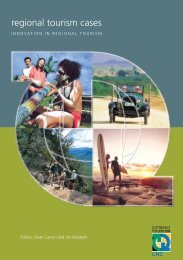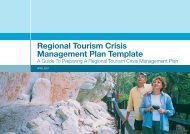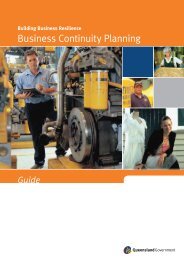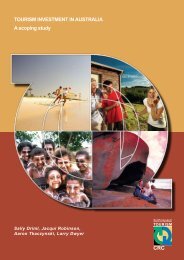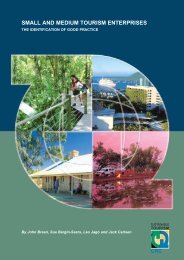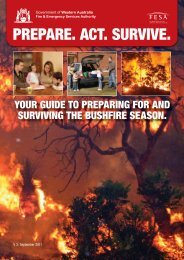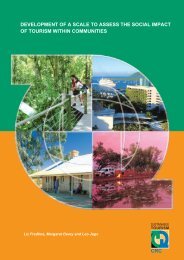Tourism Risk Management - Sustainable Tourism Online
Tourism Risk Management - Sustainable Tourism Online
Tourism Risk Management - Sustainable Tourism Online
You also want an ePaper? Increase the reach of your titles
YUMPU automatically turns print PDFs into web optimized ePapers that Google loves.
Training of Staff<br />
Crises inevitably require personnel to step outside their normal day-to-day roles and responsibilities<br />
and to carry out tasks which are far less familiar. To make it even more difficult, not only are many of<br />
the tasks unfamiliar, but they must be carried out in the highly stressful environment which crises<br />
produce. For these reasons it is very important that personnel be trained for and regularly tested in<br />
their crisis management tasks. Personnel also need the opportunity to practise their tasks as skill<br />
levels will deteriorate rapidly, even given the best of training, if regular practice is not undertaken.<br />
A planning committee should identify the specific crisis management training needs of personnel and<br />
ensure that appropriate initial and ongoing training is provided. This must also include relevant<br />
induction programs for new staff.<br />
Testing Plans and Personnel – Crisis <strong>Management</strong> Exercises (Mock Crises)<br />
The fundamental purpose of training and exercising is to improve the capacity to respond efficiently<br />
and effectively in times of crisis. Crisis management exercises can:<br />
• reveal planning weaknesses;<br />
• expose resource gaps;<br />
• clarify roles and responsibilities;<br />
• improve individual performances;<br />
• build confidence;<br />
• develop proficiency;<br />
• test plans, systems and procedures; and<br />
• foster cooperation between tourism operators and destinations.<br />
Most importantly, whilst exercises can’t exactly duplicate the stressors imposed by crises, they do<br />
provide an opportunity to assess the ability of personnel to perform under stressful conditions. An<br />
exercise will also identify whether or not plans, systems and procedures can withstand the same<br />
crisis pressure.<br />
That's what you need to know. Crisis management is not about being able to function in normal<br />
surroundings or circumstances. It's about being able to function effectively under crisis pressure, in<br />
abnormal surroundings or circumstances - and not everyone, or every system, can do so.<br />
Exercises provide the opportunity for personnel from the visitor region to work together and to<br />
develop an understanding of how others operate, their priorities and systems, and to develop an<br />
effective working relationship.<br />
Exercise Options<br />
The starting point of exercise management is to identify what exactly it is that you want to test and<br />
what is the best way to go about it. Destinations may choose to access personnel skilled in exercise<br />
development and management in order to maximize the benefits. Types of exercise include:<br />
56 <strong>Tourism</strong> <strong>Risk</strong> <strong>Management</strong> – An Authoritative Guide to Managing Crises in <strong>Tourism</strong>



